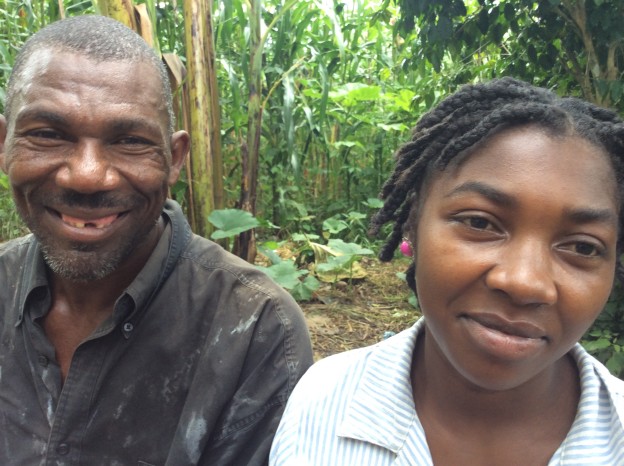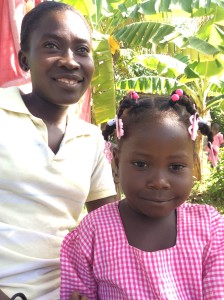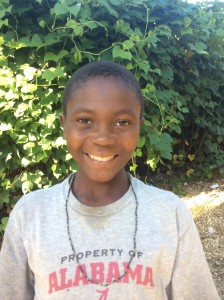Jaklin lives with her husband Bob and their children in Fonpyèjak, a farming area that rises out of Bay Tourib towards the high plateau that overlooks both it and Boukankare to the south. When she and her family joined the CLM program in the summer of 2011, they had very little.
They had access to some of the farmland above and around Fonpyèjak, even to a small plot that surrounds the house they were living in. That house belonged to one of Bob’s brothers, but he let them use it. They couldn’t do much with the land, though. The pressure to put food on the table every day kept them from investing time and money in activities that would take months to bring anything in. When Bob was around, he would work for wages in their neighbors’ fields.
Now and again he would leave for the Dominican Republic. Then Jaklin would have to shift for herself and their growing family. Each time Bob returned, he would try to come with some extra money. Jaklin would use it to buy plastic sandals in Tomond, which she’d sell in the rural markets around Bay Tourib. Business was generally good, and each time she would restart her business it would work for a while. But eventually it would collapse, usually because of pregnancy. She and Bob weren’t using family planning. She’d be unable to sell for a few months, and would feed her children with the money in the business until it disappeared or until Bob returned. They were hungry much of the time.
Jaklin was accustomed to the way that she and her family lived. She had always lived in terrible poverty. When she joined the program, her mother Mirana joined as well. And if anything, Mirana was even poorer than her daughter, though she only had her youngest child still depending in her. She had been together with a man, Jaklin’s stepfather, for years, since shortly after that death of Jaklin’s dad, and for most of those years he had been disabled by poor health. Unlike Jaklin, who had a willing partner in Bob, Mirana was on her own.
Their lives started to change as soon as they entered the program. For its first six months, they received a stipend of about $1 per day. Though it was very little, and though they would struggle to save a small portion of it to invest, it was enough to ensure they’d have something, however minimal, to feed the children every day. This freed Bob to stay at home and farm for himself. His mother had a couple of plots that he could work rent-free.
During their weekly conversation with their case manager, they learned about family planning. Haitians in the countryside have a saying, “Children are a poor person’s one asset.” But Jaklin and Bob began to see the realities connecting their poverty to Jaklin’s frequent pregnancies and to the expenses that were increasing as their family grew. They decided use the planning available free of charge at the Partners in Health clinic near their home.
Bob’s increased presence at home made it easier for them to make additional progress. CLM set Jaklin up with merchandise to restart her sandal business, and the business took off. Bob would purchase loads of sandals for her in Tomond or even in Port au Prince, and she would sell them in Regalis, Zabriko, and Koray. She’d sell them out of her home on days without a market. The more she was able to manage their expenses with her profits, the freer Bob became to focus on farming, and for the first time in years they brought in an impressive crop of beans, the main cash crop in the hills around Bay Tourib. When he and Jaklin brought their harvest to market, they made enough money that they were able to afford to buy a mule. Having a pack animal, in turn, helped them increase their business because it meant they were no longer limited to selling what they could carry on their head.
Jaklin and Bob continued to prosper. They replaced the leaf-covered house they had been living in with a larger house covered with a tin roof. The new house was the first one that belonged to them. They graduated from CLM in March 2013, easily meeting all the graduation criteria despite suffering setbacks in the program’s final months. Their bean crop was devastated by consecutive hurricanes in the fall of 2012, and at the end of that year their sandal business was nearly destroyed because Bob lost most of their capital when he was robbed while in Port au Prince to do the buying.
After graduation, they kept moving forward. Between Bob’s farming and Jaklin’s small commerce, their income continues to grow. They built a grain-storage hut behind their new house. With their growing harvests, they really felt the need for one. Eventually, they were able to buy the plot of land the house was on, along with the small garden around it. And now they plan to buy some additional plots to farm.
Midway through 2014, Jaklin became pregnant with their sixth child. She had missed the date she was scheduled to receive the contraceptive she was usuing every three months. It was a difficult pregnancy, but she and Bob knew how to get help. When the doctor at the Partners in Health clinic saw she was in trouble, she sent her by truck to the hospital in Ench. There she delivered a healthy boy, and had her tubes tied. “Children are expensive, and six is enough.”
Jaklin and Bob have an entirely new life. They have a comfortable house to live in, the money they need to keep their children fed and in school, and a plan for further progress. And the best part of it is the way they now can and do face its challenges together.


